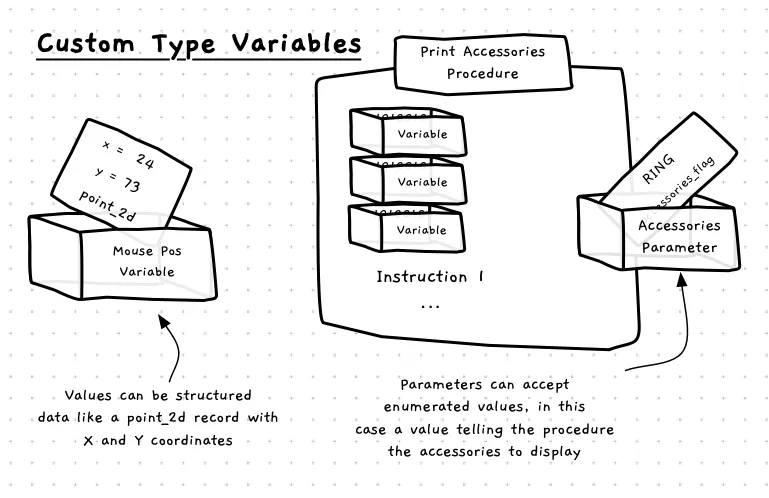Variables with Custom Types
The custom types allow you to specify new data formats. To make use of this format you must declare variables that use the types you have created. You can use your new types when you declare local variables and parameters, allowing you to store values in this format and pass the around between your functions and procedures.

Variables - Why, When, and How
Variables haven’t changed, but now you have more control over what they can store. Once you have created your own type, you can use this type when you create a variable - where ever that variable is coded.
In C/C++
In C/C++ it is possible to initialise a struct when you declare the variable. To do this, you use braces to wrap the values for the fields as (i.e. {...} ). Within the braces you place one value for each field, in the order you declared them in the struct. These values are then used to initialise the fields of the variable. See the declaration of var2 in the example below.
Unions can also have their values initialised. This also uses the brace notation, but this time you name the field you want to initialise. This sets the value of the union to store the indicated type. See the declaration of var5 in the code below.
Example
The following example demonstrates declaring and using values from the different kinds of types you can create.
#include "splashkit.h"
using std::to_string;
struct my_struct{ int field1; double field2; string field3;};
enum my_enum{ OPT_1, OPT_2};
union my_number{ int int_val; long long long_val; double dbl_val;};
int main(){ // Declare variables, strucutres, enums, and unions. my_struct var1; my_struct var2 = {1, 3.1415, "Fred"}; my_struct var3 = var2;
my_enum var4 = OPT_1;
my_number var5 = { .int_val = 98 };
// Play with record/structures var1.field1 = 2; var1.field2 = 6.5; var1.field3 = "Wilma";
write_line( "var1 " + to_string(var1.field1) + " " + to_string(var1.field2) + " " + var1.field3 );
write_line( "var2 " + to_string(var2.field1) + " " + to_string(var2.field2) + " " + var2.field3 );
// Play with enums write_line("Int value of var4 is " + to_string(var4)); var4 = OPT_2; write_line("Int value of var4 is " + to_string(var4));
// Play with unions write_line("Int value of var5 is " + to_string(var5.int_val));
var5.long_val = 123456; write_line("Long value of var5 is " + to_string(var5.long_val));
var5.dbl_val = 3.1415; write_line("Double value of var5 is " + to_string(var5.dbl_val));
return 0;}